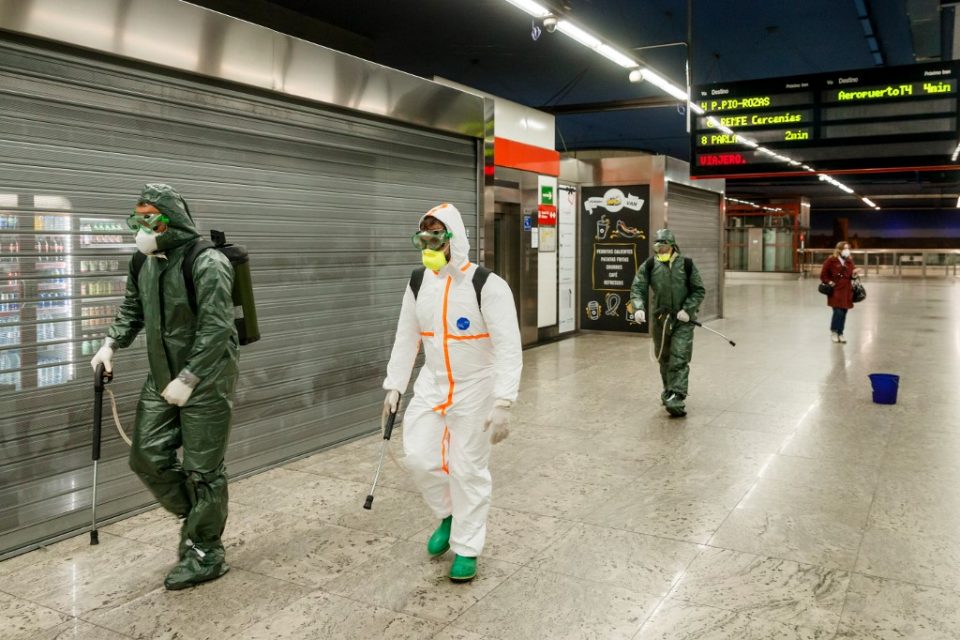
MADRID, Spain (AFP) — The coronavirus death toll rose to 1,002 in Spain on Friday after 235 people died in 24 hours, and the number of cases approached 20,000, the health ministry said.
The spiraling number of infections has propelled Spain into the top four worst-hit countries in the world — with the figures growing as the country steps up its capacity for testing, forcing doctors to have to make choices as to which cases to treat as the most urgent priorities.
Over the past seven days, the number of deaths has risen ten-fold, the figures show.
“The worst days are still to come,” warned the
Minister of health, Salvador Illa, saying the peak of cases had still to be reached before the country could hope to beat the virus.
Since the last update around midday on Thursday, another 2,833 infections have been confirmed, taking the overall number of cases to 19,980, the ministry’s emergency coordinator Fernando Simon said.
But he said it was “very likely that the figures underestimated the overall number” of people with the virus, saying the testing laboratories were “overwhelmed” which could skew the numbers.
Of those diagnosed, 52 percent were in the hospital and around six percent were being treated in intensive care.
Madrid remains the worst-hit area, accounting for 7,165 cases, or 36 percent of the total infections in Spain, while the number of deaths in the capital rose to 628 — around 63 percent of the national total.
Government figures show that 1,585 cases have recovered, three-quarters of whom are in the Madrid region.
Meanwhile, Madrid and Barcelona announced on Friday they would set up field hospitals in their biggest exhibition halls to deal with the anticipated growth in the number of patients.
In Madrid, the IFEMA conference center would be fitted with 5,500 hospital beds, part of it dedicated to an intensive care unit, while a section of the Fira de Barcelona center would be similarly equipped, city authorities said.
Over the last few hours, a total of 2,640 troops had disinfected the country’s main airports and ports along with retirement homes and prisons, General Miguel Angel Villarroya, chief of the defense staff, told the same news conference.
Hard choices
With many health services having hit saturation point doctors working in intensive care units said hard choices had to be made and recommended “prioritizing” patients deemed to have “the greatest life expectancy,” comments which made headline news in the country’s media.
With items such as protective masks in short supply, Illa said that more medical supplies would be available within days with 300,000 masks due to arrive from Germany on Saturday.
“We lack everything… equipment, staff, protective gear,” Eduardo Fernandez, a 39-year-old Madrid nurse, told AFP.
“And all of that creates chaos which does not help to take the pressure off which we are already under with our backs to the wall. We know it is going to last for days, weeks, months.”
Spanish authorities have also been toughening their line against those citizens who do not respect the rules of confinement.
On Thursday, police arrested 55 people for not respecting the lockdown that was put in place at the weekend, under which Spain’s 46 million population can only leave home to shop for food or medicine, go to the hospital or go to work.
National police chief Jose Angel Gonzalez said there was “a rising trend” in the number of people defying the stay-home order, warned that police were operating with a policy of “zero tolerance.”
By Friday evening, more than 315 people had been arrested for confinement violations, Interior Minister Fernando Grande-Marlaska said, adding Spaniards should not head for the beach or the countryside over the weekend.
Despite his plea, media showed a steady stream of cars heading out from cities for some weekend light relief.
© Agence France-Presse








